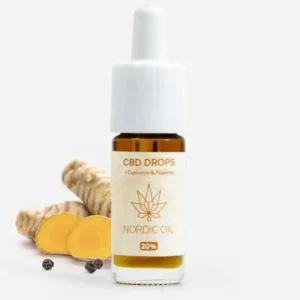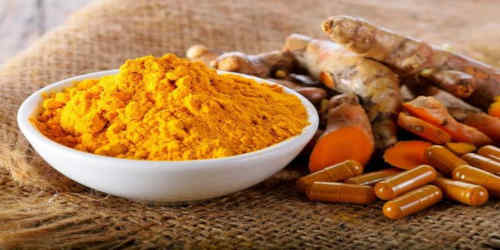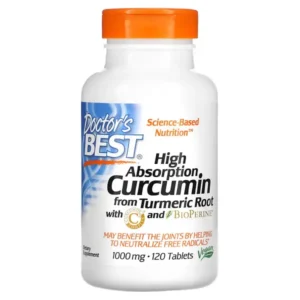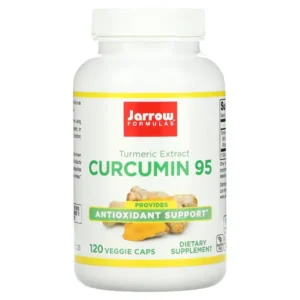What is Turmeric?
Turmeric is a spice with beneficial properties, originating in Asia, which is obtained from the root of the Curcuma longa plant. It has been used for centuries as an ingredient in Middle Eastern Asian cuisine and traditional medicine (Ayurveda) to treat a wide range of disorders including digestive problems, inflammation, infections, and even cancer.
In recent years, it has also become increasingly popular as a dietary supplement due to the many healthful properties attributed to it.
Turmeric properties
Turmeric contains a substance called curcumin, which is a polyphenol with antioxidant, antibacterial, and anti-inflammatory properties, and is the main active component of turmeric.
Curcumin's anti-inflammatory action is due to its ability to inhibit the activation of several molecules that cause inflammation, while its antioxidant action occurs thanks to its ability to neutralize free radicals, which can damage our body's cells.
Studies have shown that curcumin can be useful in reducing inflammation, which is associated with many chronic diseases such as diabetes, heart disease, and arthritis. Additionally, curcumin may help reduce the risk of cancer through various mechanisms, including inhibition of tumor growth and prevention of the formation of blood vessels that feed cancers.
Other research suggests that curcumin may also be useful in improving brain function, reducing the risk of neurodegenerative diseases such as Alzheimer's, fighting depression, treating rheumatoid arthritis, Crohn's disease, and ulcerative colitis.
Using Tumeric
o enjoy the benefits of this miraculous substance, you can add it to your favorite recipes, such as in legume soup, yogurt, milk (Golden Milk), salads, or curry dishes.
Alternatively, you can buy turmeric and curcumin supplements, in the form of capsules, tablets, or liquid extracts, which can be helpful in achieving therapeutic doses of this beneficial substance.
Curcumin can be better absorbed through various strategies. It can be taken with a small amount of black pepper, which contains a substance called piperine that helps to increase the absorption of curcumin in the intestine.
In addition, taking curcumin with fatty foods can also help increase absorption since curcumin is soluble in fats.
Side Effects and Contraindications
Curcumin is generally considered safe when taken in recommended doses. However, in some cases, side effects such as stomach upset, diarrhea, nausea, or allergic reactions may occur.
Moreover, curcumin may interact with some medications and may increase the risk of bleeding if taken with anticoagulants. Therefore, it is recommended to consult a doctor before taking curcumin supplements if you are taking medication or have chronic diseases.
In particular, the use of curcumin is not recommended in the case of gallstones, biliary tract obstruction, and during pregnancy and breastfeeding. Additionally, it is important to ensure that it is produced from reliable sources and has been tested for its purity and safety.
Turmeric and the Liver: Discrediting Alarms
Alarmist news has been spread about turmeric as a food supplement, accused of causing cases of acute non-infectious and non-contagious cholestatic hepatitis.
We know how, when it comes to discrediting unconventional medicine remedies, official channels are immediately extremely solicitous, and how in a short time, confusion can be created and fears can be created among consumers without giving accurate and in-depth information about it.
For several years, I have also used this supplement as an anti-inflammatory, especially taking it as an anti-Tnf_ alpha, and I have never had any problems. In fact, I believe that it has helped me a lot, along with other remedies.
After weeks of uncertainty and increasingly alarming headlines about the use of turmeric, the results of the investigation were published: it was a dosage abuse, and the advertisements that attribute to this plant the imaginary slimming properties have pushed some people to take doses well above those recommended.
We always recommend taking high-quality supplements and always reading labels, origin, and content, as well as taking the dose recommended by your doctor without being influenced by deceptive advertisements that promise miracles.
Some researches about Turmeric
- "Efficacy and safety of curcuminoid in major depressive disorder: a randomized controlled trial." Journal of Clinical Psychopharmacology. https://www.ncbi.nlm.nih.gov/pmc/articles/PMC5664031/
- "Curcuminoid as a Therapeutic Agent: The Evidence from in Vitro, Animal and Human Studies." Advances in Experimental Medicine and Biology. https://www.ncbi.nlm.nih.gov/pmc/articles/PMC3535097/
- "Curcuminoid treatment for knee osteoarthritis: a randomized double-blind placebo-controlled trial"
https://pubmed.ncbi.nlm.nih.gov/24853120/ - "Curcuminoid Inhibits the Proliferation of Human Prostate Cancer Cells by Inducing G1 Arrest and Apoptosis."
https://pubmed.ncbi.nlm.nih.gov/11398177/
 |







